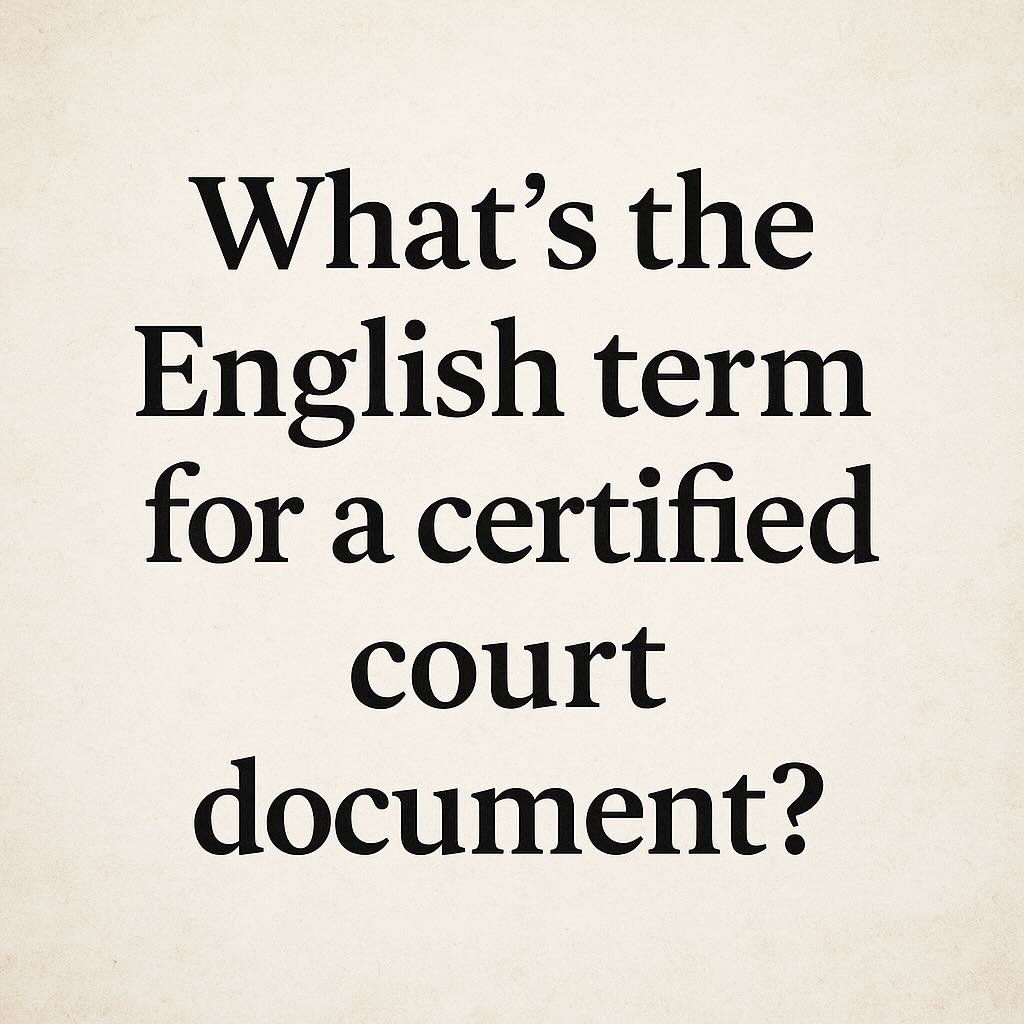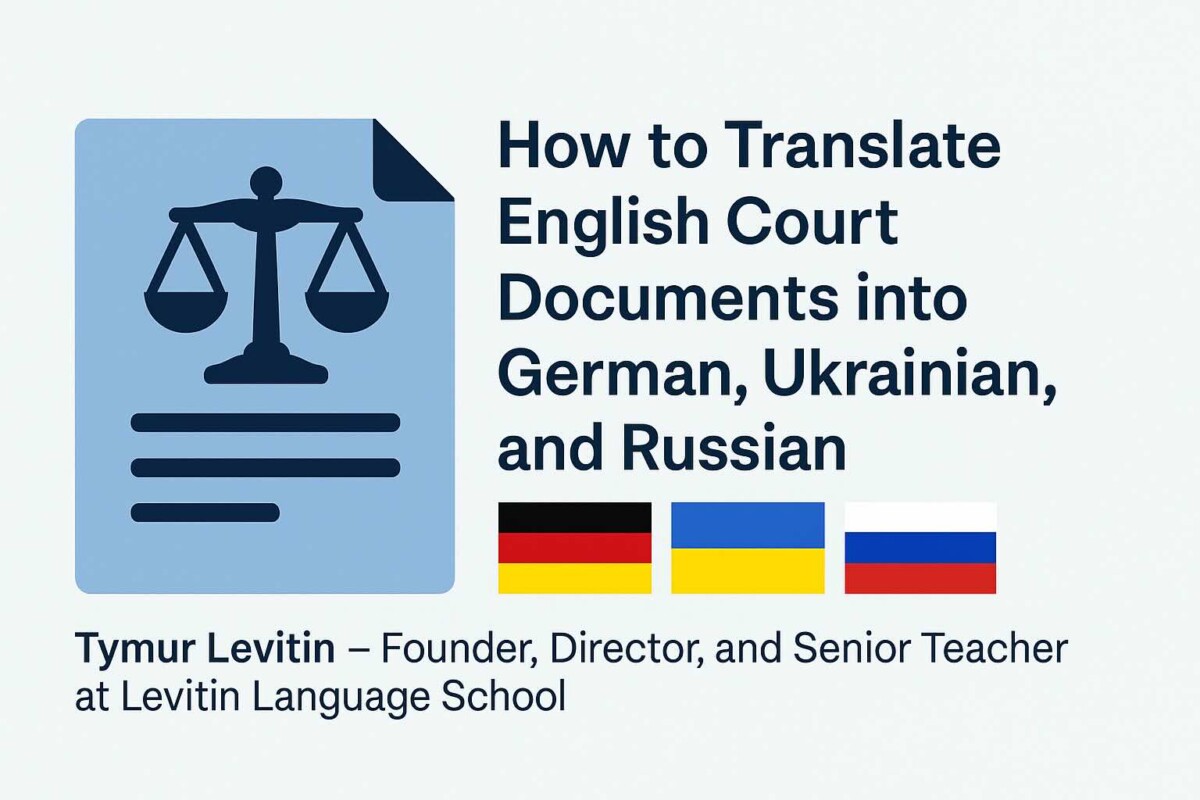📘 Legal terminology that’s easy to misread — and dangerous to mistranslate
👤 Author: Tymur Levitin — founder, director, and senior teacher at Levitin Language School
📍 Choose your language:
🔗 https://levitinlanguageschool.com/#languages
⚖️ Why English Legal Terms Require More Than Just Translation
English court terminology is widely used around the world — in legal contracts, immigration, international disputes, and corporate procedures. But these words don’t always mean what you think they mean.
Even common terms like judgment, order, decisionlub writ can have very specific procedural meanings. Worse, they may not correspond directly to legal systems in German-speaking countries, Ukraine, or post-Soviet states. A literal translation often fails — and a legal translation must bridge different legal traditions.
This article explains how to translate core English court terms into Niemiecki, Ukraińskioraz Rosyjski — with real examples, context, and comparison for both professionals and learners.
🧾 Core English Court Terms and Their Meaning
Let’s examine the most frequently used terms:
| English Term | Meaning in Context | Niemiecki | Ukraiński | Rosyjski |
|---|---|---|---|---|
| Judgment | Final ruling after trial | Urteil / Endurteil | Рішення суду | Решение суда |
| Court Order | Instruction by court (not final) | Beschluss / Gerichtsbeschluss | Ухвала суду | Определение суда |
| Decision | General ruling — procedural or final | Entscheidung / Urteil | Рішення / Висновок | Решение / Заключение |
| Writ | Official written command (e.g., subpoena, enforcement) | Vollstreckungsbefehl / Verfügung | Судовий наказ / Постанова | Судебный приказ / Исполнительный лист |
⚠️ Uwaga: “Decision” is the most ambiguous. In UK/US systems, it can mean anything from a small procedural ruling to a final verdict — context is key.
🧪 Real-Life Examples: What Do These Terms Look Like?
1. Judgment – Resolves the Case
📄 Judgment in a breach of contract case.
- DE: Urteil in einem Vertragsverletzungsverfahren
- UA: Рішення суду у справі про порушення контракту
- RU: Решение суда по делу о нарушении контракта
2. Court Order – Procedural or Interim Instruction
📄 Court order granting temporary custody.
- DE: Gerichtsbeschluss über das vorläufige Sorgerecht
- UA: Ухвала суду про тимчасове опікунство
- RU: Определение суда о временной опеке
3. Writ – Legal Instrument (Execution, Summons, Injunction)
📄 Writ of execution for unpaid judgment.
- DE: Vollstreckungsbefehl wegen unbezahltem Urteil
- UA: Судовий наказ на виконання рішення
- RU: Исполнительный лист по неуплаченному решению
🧠 Translation Pitfalls: Avoid These Mistakes
❌ Translating “judgment” as “decision” in systems where both exist separately
❌ Using “order” = “наказ” in Ukrainian — causes legal confusion with “судовий наказ”
❌ Leaving “writ” untranslated or vaguely translated as “document” — erases legal function
❌ Assuming “decision” = Urteil — when it may just be Beschluss or even Verfügung
🧩 Understanding the Legal Logic Across Languages
| Legal Role | Angielski | Niemiecki | Ukraiński | Rosyjski |
| Final resolution | Judgment | Urteil | Рішення суду | Решение суда |
| Procedural ruling | Court Order | Beschluss | Ухвала суду | Определение суда |
| General ruling | Decision | Entscheidung | Рішення / Висновок | Решение / Заключение |
| Legal instrument | Writ | Vollstreckungsbefehl | Судовий наказ | Судебный приказ |
| Extract or copy | Certified Copy / Extract | Auszug / beglaubigte Abschrift | Витяг / Завірена копія | Выписка / Заверенная копия |
📄 What About the Document Itself? Translating the Physical “Court Document”
In Ukrainian and Russian, the phrase Рішення суду lub Решение суда often refers both to the decision and to the physical paper.
In German, these concepts are split:
- Urteil = the decision
- Urkunde = the certified document that contains it
But what about English?
| Scenario | Correct English Term |
| Legal outcome | Judgment lub Decision |
| Certified physical paper | Certified Copy of Judgment, Official Court Documentlub Court-Issued Record |
Don’t confuse legal meaning z physical form.
🧾 Real-World Examples of Court Documents (the Papers)
Example 1:
📄 Certified copy of a judgment in a divorce case
- EN: Certified Copy of Judgment
- DE: Ausfertigung des Urteils
- UA: Завірена копія рішення суду
- RU: Заверенная копия решения суда
Example 2:
📄 Court-issued document confirming custody
- EN: Official Court Document
- DE: Gerichtliche Urkunde
- UA: Судовий документ
- RU: Судебный документ
🧠 Why Translators Get This Wrong
English uses separate terminology for legal content vs legal form. In Slavic languages, these are often merged — one word can mean both. German strictly separates between Urteil oraz Urkunde. English also separates them — but often less visibly.
Translators may:
- Translate “Urkunde” as “judgment” — ❌ Wrong
- Translate “решение суда” as both judgment and document — ❌ Vague
📘 Summary Table: Physical Court Document vs Legal Meaning
| Język | Legal Resolution (Decision) | Certified Paper (Document) |
| Angielski | Judgment / Decision | Certified Copy / Court Document |
| Niemiecki | Urteil | Urkunde / Ausfertigung |
| Ukraiński | Рішення суду | Завірена копія / Витяг |
| Rosyjski | Решение суда | Выписка / Заверенная копия |
✅ Use terms based on function, not just language similarity.
🔎 Functional Equivalence Is the Key
Your translation must match:
- 📌 The legal function of the term
- 📄 The form — full text vs extract
- 🛂 The purpose — evidence, enforcement, apostille

📚 Related Articles
- How to Translate German Court Documents into Ukrainian, English, and Russian
- How to Translate Ukrainian Court Terms into German, English, and Russian
- Understanding Realia in Translation
🎓 Learn Legal English and German with Us
✍️ Author and Copyright
Autor: Tymur Levitin — founder, director, and senior teacher at
Rozpoczęcie szkoły językowej przez Tymura Levitina / Szkoła językowa Levitin
© Tymur Levitin. Wszelkie prawa zastrzeżone.
Translation structure and methodology based on real-world legal practice.
























